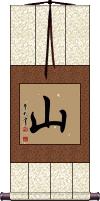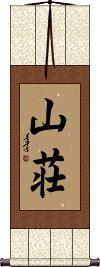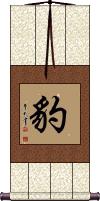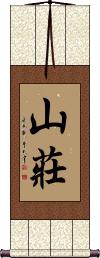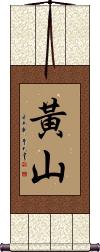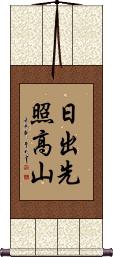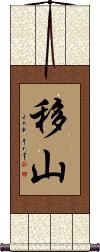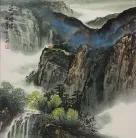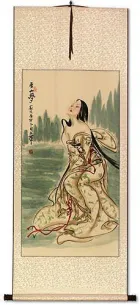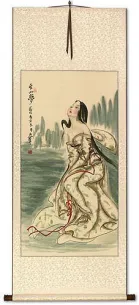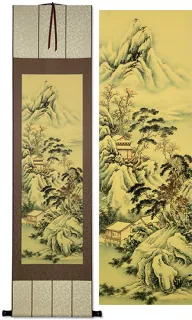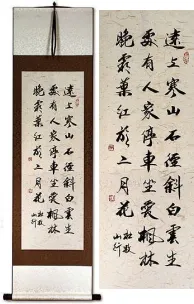Many custom options...
And formats...

Mountain in Chinese / Japanese...
Buy a Mountain calligraphy wall scroll here!
Personalize your custom “Mountain” project by clicking the button next to your favorite “Mountain” title below...
1. Mountain
5. Huang Shan / Yellow Mountain
7. Mountain Travels Poem by Dumu
8. When the sun rises it first shines on the highest mountain
Mountain
Mountain Villa
Leopard / Panther / Jaguar
豹 is the Chinese and Japanese word for the big cat known as a leopard, panther, or Jaguar.
This can refer to most cats of the Panthera genus as well as the Puma genus (but this is not used for most kinds of lions, except smaller ones like the mountain lion).
Because Jaguars are not native to Asia, the characters for “American continent” is usually added before this character to specifically designate a Jaguar.
This also kind of means Panther or Leopard in Korean Hanja but in modern Korean, they add a Hangul character to complete the word.
Mountain Villa
山莊 is a Chinese word that literally means “mountain villa.”
It can also be translated as a manor house or just a villa. 山莊 is used in hotel names and other fancy titles.
Huang Shan / Yellow Mountain
High Mountain Long River
山高水長 is a Chinese idiom that means “high as the mountain and long as the river.”
It figuratively means “noble and far-reaching.”
Not sure this is valid or commonly used in Korean. It probably was borrowed into Korean a few hundred years ago but is obscure now.
Mountain Travels Poem by Dumu
This poem was written almost 1200 years ago during the Tang dynasty.
It depicts traveling up a place known as Cold Mountain, where some hearty people have built their homes. The traveler is overwhelmed by the beauty of the turning leaves of the maple forest that surrounds him just as night overtakes the day, and darkness prevails. His heart implores him to stop, and take in all of the beauty around him.
First, before you get to the full translation, I must tell you that Chinese poetry is a lot different than what we have in the west. Chinese words simply don't rhyme in the same way that English or other western languages do. Chinese poetry depends on rhythm and a certain beat of repeated numbers of characters.
I have done my best to translate this poem keeping a certain feel of the original poet. But some of the original beauty of the poem in its original Chinese will be lost in translation.
Far away on Cold Mountain, a stone path leads upwards.
Among white clouds, people's homes reside.
Stopping my carriage I must, as to admire the maple forest at nights fall.
In awe of autumn leaves showing more red than even flowers of early spring.
Hopefully, this poem will remind you to stop, and “take it all in” as you travel through life.
The poet's name is “Du Mu” in Chinese that is: ![]()
![]() .
.
The title of the poem, “Mountain Travels” is: ![]()
![]()
You can have the title, poet's name, and even “Tang Dynasty” written as an inscription on your custom wall scroll if you like.
More about the poet:
Dumu lived from 803-852 AD and was a leading Chinese poet during the later part of the Tang dynasty.
He was born in Chang'an, a city in central China and the former capital of the ancient Chinese empire in 221-206 BC. In present-day China, his birthplace is currently known as Xi'an, the home of the Terracotta Soldiers.
He was awarded his Jinshi degree (an exam administered by the emperor's court which leads to becoming an official of the court) at the age of 25 and went on to hold many official positions over the years. However, he never achieved a high rank, apparently because of some disputes between various factions, and his family's criticism of the government. His last post in the court was his appointment to the office of Secretariat Drafter.
During his life, he wrote scores of narrative poems, as well as a commentary on the Art of War and many letters of advice to high officials.
His poems were often very realistic and often depicted everyday life. He wrote poems about everything, from drinking beer in a tavern to weepy poems about lost love.
The thing that strikes you most is the fact even after 1200 years, not much has changed about the beauty of nature, toils, and troubles of love and beer drinking.
When the sun rises it first shines on the highest mountain
This old Buddhist phrase means, “When the sun rises it always shines first on the highest mountain,” or “When the sun appears, it first casts its light upon the highest mountain.”
This comes from the Avatamsaka Sutra and has been used as the name or portion of the name for temples in Japan and sites in China.
The Buddha's first round of teaching (Avatamsaka period) is likened to the time when the sun rises from the east horizon. When the sun first rises it illuminates the high mountains. In this analogy, the high mountains represent the great Bodhisattvas and/or those most ready to receive enlightenment and liberation.
This can be romanized from Japanese as “Nichi shutsu sen shō kō san,” “Nisshutsu saki teru takayama,” or “Hide temazu kōzan wo terasu yama.” The last one is probably the most common. Ask three Japanese people what they think the pronunciation is, and you will get three different opinions.
Where There is a Will, There is a Way
A determined effort can move a mountain
愚公移山 is the Chinese proverb (also somewhat known in Japan and Korea) for “the silly old man moves a mountain.”
Figuratively, this means “where there's a will, there's a way.”
Based on a fable of Lord Yu (愚公). He moved the soil of the mountain in front of his house. After years of effort, he finally moved the entire mountain (some versions of the story have God seeing how determined the man was, and sending two angels to whisk the mountains away).
The moral of the story: Anything can be accomplished if one works at it ceaselessly.
The Japanese version of this is 愚公山を移す (gu kou yama wo utsu su). But better to get the Chinese version, since this is originally a Chinese proverb.
See Also: Nothing is Impossible
Nothing is Impossible with Persistence
移山 is the Chinese, Japanese Kanji, and old Korean Hanja for “to remove mountains” or “to move a mountain.”
Figuratively, this means you can accomplish the impossible by sheer persistence.
移山 is the short form of a proverb about a man who had much persistence and could move a whole mountain (a bucket of soil at a time).
This in-stock artwork might be what you are looking for, and ships right away...
Gallery Price: $72.00
Your Price: $39.88
Gallery Price: $60.00
Your Price: $39.88
Gallery Price: $200.00
Your Price: $79.88
Gallery Price: $200.00
Your Price: $79.88
Gallery Price: $60.00
Your Price: $39.88
Gallery Price: $60.00
Your Price: $39.88
Gallery Price: $83.00
Your Price: $45.88
Gallery Price: $72.00
Your Price: $39.88
Gallery Price: $72.00
Your Price: $39.88
Gallery Price: $60.00
Your Price: $39.88
Gallery Price: $160.00
Your Price: $88.77
The following table may be helpful for those studying Chinese or Japanese...
| Title | Characters | Romaji (Romanized Japanese) | Various forms of Romanized Chinese | |
| Mountain | 山 | yama | shān / shan1 / shan | |
| Mountain Villa | 山荘 | yamajou / sansou yamajo / sanso | ||
| Leopard Panther Jaguar | 豹 | hyou / hyo | bào / bao4 / bao | pao |
| Mountain Villa | 山莊 山庄 | shān zhuāng shan1 zhuang1 shan zhuang shanzhuang | shan chuang shanchuang |
|
| Huang Shan Yellow Mountain | 黃山 黄山 | huáng shān huang2 shan1 huang shan huangshan | ||
| High Mountain Long River | 山高水長 山高水长 | shān gāo shuǐ cháng shan1 gao1 shui3 chang2 shan gao shui chang shangaoshuichang | shan kao shui ch`ang shankaoshuichang shan kao shui chang |
|
| Mountain Travels Poem by Dumu | 遠上寒山石徑斜白雲生處有人家停車坐愛楓林晚霜葉紅於二月花 远上寒山石径斜白云生处有人家停车坐爱枫林晚霜叶红于二月花 | yuǎn shàng hán shān shí jìng xiá bái yún shēng chù yǒu rén jiā tíng chē zuò ài fēng lín wǎn shuàng yè hóng yú èr yuè huā yuan3 shang4 han2 shan1 shi2 jing4 xia2 bai2 yun2 sheng1 chu4 you3 ren2 jia1 ting2 che1 zuo4 ai4 feng1 lin2 wan3 shuang4 ye4 hong2 yu2 er4 yue4 hua1 yuan shang han shan shi jing xia bai yun sheng chu you ren jia ting che zuo ai feng lin wan shuang ye hong yu er yue hua | yüan shang han shan shih ching hsia pai yün sheng ch`u yu jen chia t`ing ch`e tso ai feng lin wan shuang yeh hung yü erh yüeh hua yüan shang han shan shih ching hsia pai yün sheng chu yu jen chia ting che tso ai feng lin wan shuang yeh hung yü erh yüeh hua |
|
| When the sun rises it first shines on the highest mountain | 日出先照高山 | hiide temazu kousan wo terasu yama hide temazu kosan wo terasu yama | rì chū xiān zhào gāo shān ri4 chu1 xian1 zhao4 gao1 shan1 ri chu xian zhao gao shan richuxianzhaogaoshan | jih ch`u hsien chao kao shan jihchuhsienchaokaoshan jih chu hsien chao kao shan |
| Where There is a Will, There is a Way | 愚公移山 | yū gōng yí shān yu1 gong1 yi2 shan1 yu gong yi shan yugongyishan | yü kung i shan yükungishan |
|
| Nothing is Impossible with Persistence | 移山 | isan | yí shān / yi2 shan1 / yi shan / yishan | i shan / ishan |
| In some entries above you will see that characters have different versions above and below a line. In these cases, the characters above the line are Traditional Chinese, while the ones below are Simplified Chinese. | ||||
Successful Chinese Character and Japanese Kanji calligraphy searches within the last few hours...
